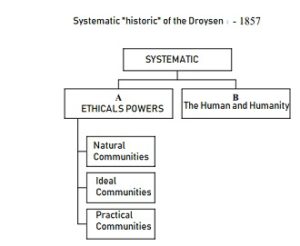
The importance of Droysen’s legacy
We stated last week that both the perspective of Droysen’s Hellenism (he coined the term) and the perspective of the true meaning of his story were broader, long before Gadamer’s criticisms of “romantic” historicism, this author who was a student of Hegel , had already done so and with much property because in addition to being a student, he entered the concept that Hegel is for modern philosophy its founder.
long before Gadamer’s criticisms of “romantic” historicism, this author who was a student of Hegel , had already done so and with much property because in addition to being a student, he entered the concept that Hegel is for modern philosophy its founder.
Johann Gustav Droysen (1808-1884) questioned the principle of historicity, and, long before his time, questioned historians about the “scientific” foundations of a certain perspective and relativism, as well as indirectly questioning Dilthey in an attempt to use history to support the Sciences of the Spirit.
Droysen in his Compendium on History (Grundriss der Historik) that was not suitable for History, since it pretends to be science, to borrow without a method from another perspective of knowledge, which is natural science, even if as an “example”.
The solution presented by him, similar to that of Gadamer, synthesized in the methodological notion of Investigative Understanding (forschendes Verstehen), aimed to give History the possibility of an autonomous science, so for him there is something that precedes the explanation x understanding dualism, which is the history, what we called last week the “form” of thinking.
His 1857/1858 compendium of history (Grundiss der Historik) is available in Spanish (1983) and Italian (1989) versions, still in Portuguese.
Of particular interest, at least for me, was Chapter 3, which deals with the hermeneutical problem of understanding, which gives a sense of the applicability of its method.
The link that we can and should make with the moral question, from the previous topic, can be found on page 386 of her work Teologia dela Storia (Italian translation):
“… we need a Kant, who critically examines not the historical matter, but the theoretical and practical movement before and within history, and who demonstrates, like anything similar to the moral law, an imperative category of history, the living source from which the historical life of humanity flows. ”(DROYSEN, 1966, p. 386)
Droysen observes in what he calls “Systematics” three types of ethical communities: “the natural communities”, “the ideal communities” and “the practical communities” (figure above), and relates to them from history, said thus: “ours systematic resulted from the notion that the historical world is the ethical world, but while conceived from a certain point of view; because the ethical world can be considered under other points of view … ”(Droysen, 1994, p. 413).
Its becoming, therefore, is far from the Hegelian dialectic, but at the same time it dialogues with it.
DROYSEN, J. G. (1966) Teologia dela Storia. Prefazione ala Storia dell´Ellenismo II – 1843. In: Istorica. Lezioni sula Encilopedia e Metodologia dela storia. Trad.: I. Milano – Napoli: Emery.
_______. (1994) Istorica. Lezioni di enciclopédia e metodologia dela storia. Trad. Silvia Caianiello. Napoli: Guida.









